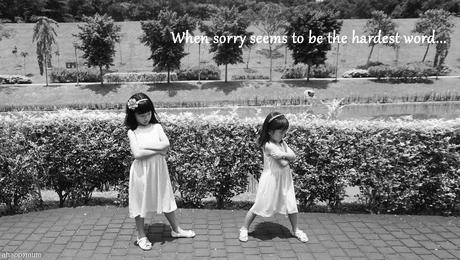Should saying sorry be enforced by parents?
You see, I have a headstrong, strong-willed firstborn who doesn't really like to say the word 'sorry' ever since she was little. Despite the fact that I try to explain the rationale behind it and why an apology is called for in some situations, especially when we hurt others, she just doesn't like to say the word.
For a long time, I strongly believed that I needed to make her say sorry when she did something wrong or bad. Even if she didn't do it on purpose or if she hurt someone accidentally, I believed that it was a virtue to be able to admit to your mistakes and it was only appropriate for her to learn to apologize. Not just that, I also felt that she should do it immediately after the wrongdoing so that she would learn and remember it in future - even if it meant that I had to force her.
This thinking of mine has gotten us into so many clashes and conflicts throughout the years that I've lost count of them all. Here's a typical example.
Me: Why did you snatch your sister's toy?
Child: But I saw it and wanted it first.
Me: Still, you shouldn't have grabbed it out of her hands like that. Say sorry.
Child: *glares* *stares* (mutters under breath and no one can hear the words) Sot-rit
Me: Say it properly, again.
Child: *stomps feet*But I said already.
Me: It needs to come from your heart. Say it again. Go on.
Child: *defiant look* *hurt ego* *I-did-no-wrong attitude* SAAW-REEE *runs away* *shuts door* *rebellious mode on*
Yup, I told her to apologize until it felt sincere and that it came not out of the mouth, but from the heart. Which it never did, obviously. What was I thinking and expecting from a child? It didn't help that the younger sibling had a tendency to say sorry more easily (sometimes too easily, in an attempt to gain credit and get in my favour) which made it seem like the big girl was even more stubborn, wilful and unforgiving than she was.
I began thinking about how different this pair of sisters can be when it comes to saying sorry and then it dawned on me. The word 'sorry' can mean so many different things and it holds different meanings and different impact for different people. Perhaps the big girl sees it as taking all the blame and sorry is a word that can rock her universe, on the other hand the sister sees it as something of little meaning and though it can appease others, it doesn't have that much of a foothold in her world.

Why do we even say 'Sorry'?
That brings me back to the question of why do we even need to say sorry and why do we want our kids to say it from a young age too. For me, it all boils down to one word - EMPATHY.
I want my kids to understand that the world doesn't revolve around them and as human beings, we are all tied to one another. I want to raise kind, polite kids who have manners not just at home but outside too, and that is why we use words like 'Please' and 'Thank you' in our everyday lives. I want them to stay down-to-earth, to be humble and considerate, to own up to mistakes and be able to learn from them. I want them to know that we have the power to hurt others and also to make them feel better, that we need to care for and love one another, that we can make this world a better place.
Having said that, I've also understood through the hard way that forcing a child to say sorry seldom helps to achieve the objective. #Sorrynotsorry is not something that I want my child to have a habit of and I don't want them to spill the word so easily that they forgot why they should say it in the first place.
If sorry becomes a word that is said for the sake of saying, it becomes insincere, meaningless and utterly useless.
While an apology still needs to come from the heart when being said, what is more important is if the child understands the consequences of her action and if she does anything to remedy and set things right (e.g. fighting with a sibling) or prevent the same thing from happening again next time (e.g. telling a lie). I've come up with a list of ways below to remind myself on how I can help develop empathy in my kids, perhaps it might come in handy for you at some point too.
8 ways to help your child develop empathy
1) Stop lashing out
It's normal for us to start reprimanding every time our kids do something wrong. It's a natural reaction that might not have their best interests at heart. I know it's going to be very hard, but let's try to skip the scolding and learn to hold our tongues for a minute. Spilled milk? It's not as bad as it seems. Sibling rivalry? It's part and parcel. Stepped onto your toes - be it literally or metaphorically? Maybe they really didn't mean it. Hurting someone intentionally? Sure, it's wrong, but go find out why first before you jump to conclusions.
2) Don't be too quick to punish
Punishments DON'T work. At least, that is what I've learnt through experience. Resorting to punishments hastily (e.g. naughty corners, caning, abstaining from a favorite activity) rarely helps the child to understand the situation, especially if he is adamant that it wasn't his fault. Punishments only serve to relay the message that parents have the last say, that their opinions and feelings don't matter, that perhaps they should just blindly obey and apologize just to appease the grown-ups and skip the punishiment.
3) Build an understanding
It's not just about making your child understand the situation or the other party's feelings, it's also about you understanding why your child reacted the way she did. How many times have we neglected to find out why they did what they did before giving in to our own assumptions based on the circumstances presented to us? My girl tends to feel strongly indignant and if she thinks that I have wronged her before she even gets to explain herself, she usually clams up and that's where our misunderstanding gets worse. I need to better learn to breathe, to calm, to ask and to understand before I even raise my voice (it's very challenging, trust me, I know).
4) Use simple terms
Make it easy for them to comprehend and be clear in delivering your message. If the child has done something wrong and is already feeling the guilt, now is not the time for us to use bombastic words or flowery language (or if your child seldom speaks Mandarin, please don't go into speaking full-fledged Mandarin with perfect enunciation now). Speak your mind but be tactful and remember your child's age so you can use words which are easy to understand.
5) Re-enact the scenario
Instead of demanding for an apology, get the child to role play and go through the scenario once again to see how they can better handle it the next time. For instance, the littler sister recently hit her brother with a toy because he took it away from her. I made her think about how she should react the next time and she gave the brother a hug, played with him a little and then went to play with other toys instead. Yes, the little tyrant will have to learn his manners and on taking turns, but the point is we don't beat each other up just because we are angry. Replaying the situation helps us to get a better understanding of how we can resolve things more amiably.
6) Encourage, not force
Encourage empathy, not force an apology. If the word sorry doesn't come from the heart, it heals nothing, changes nothing and achieves nothing. If for some reason, your child is unable to apologize there and then, give time and give space. Find the right time, usually after the child calms down and is able to think back on her actions, to discuss with her and let her know why it is important not just to say sorry, but to feel sorry too.
7) Have patience and give time
Rome wasn't build in a day; neither will an empathetic child be created overnight. We just need to do it over and over again - sometimes for years - before we can even see some results. That is not something unfamiliar to us, right? After all, parenthood is a lifelong journey and we know how tough it can get at times. Have lots and lots of patience (it's the one thing I keep telling myself I need to have more of), keep our cool, give our little ones and ourselves time, be positive and I'm pretty sure we will all yield results.
8) Be a role model
We are mums, not saints. We make mistakes too, trust me, I make them every single day. The problem is not about making mistakes but whether we are owning up to them, learning from them and not repeating them. Have the strength and willpower to say "I'm sorry" promptly when the situation calls for it so that your child can see how important it is for us to admit our mistakes. Always remember that we are the best role models for our kids and never underestimate how much they are learning from every little action of ours.
I know, it's all easier said than done but the next time my kids do something terrible and I feel inclined to go all crazy and unleash my wrath on them, I hope I can remind myself of these pointers. Ultimately, my wish is for them to grow up to be kind, compassionate and empathetic people and I hope they will think of Mama as someone who is an example of that. Not a screaming monster who goes around forcing others to say the all-important word in her dictionary - Sorry.
******
This post is part of the "A SAHM's Story" series where I share my experiences, tips and reflections of being a stay-at-home mom. It takes a SAHM to truly understand another and while many might assume that we are tai tais or that we get to shake legs all day long, only we know the amount of toil and sweat we put in just to get past each day. Likewise, only we know the true rewards and unparalleled joy that this job has brought us. Being a mum, and one who gets to witness all her children's milestones and spend precious time with them every day, is still the best thing that has ever happened to me. While I gave my kids life, they gave me a reason to live.


